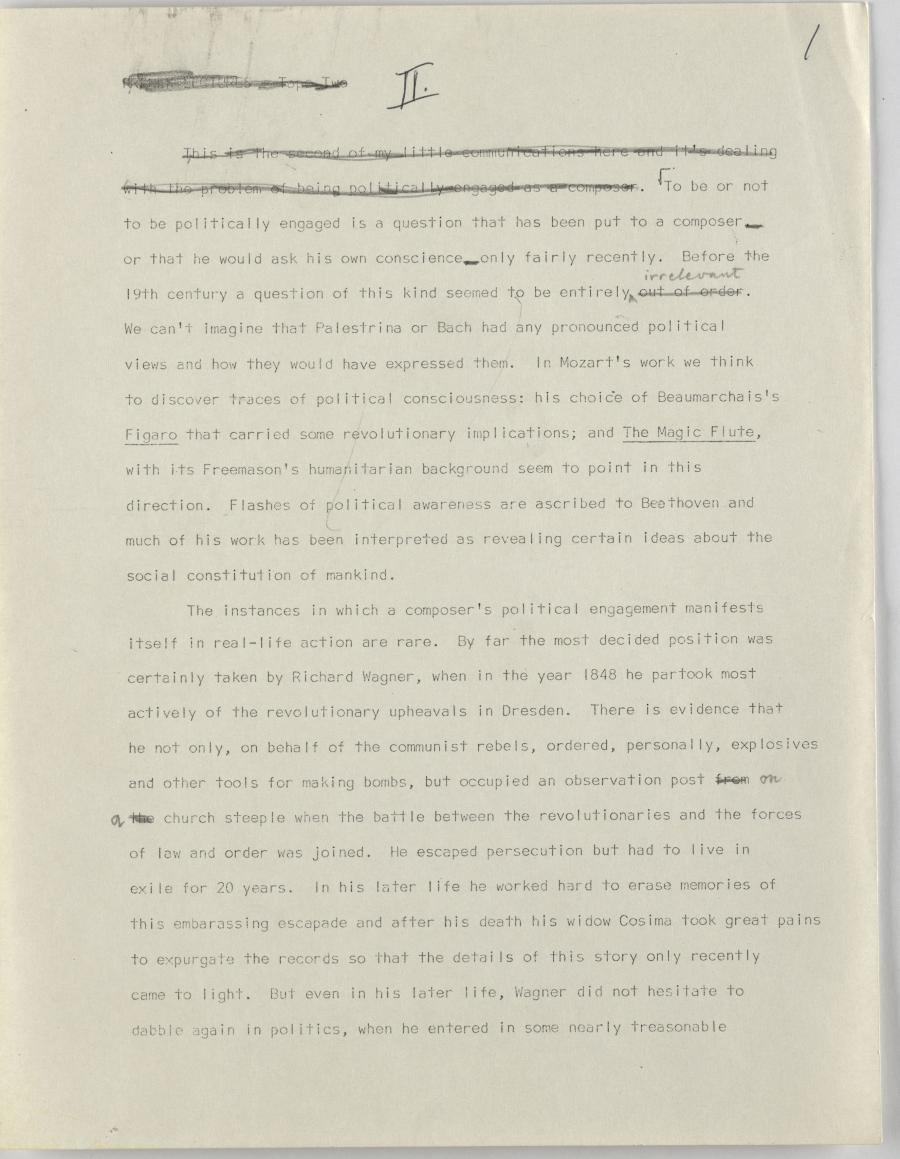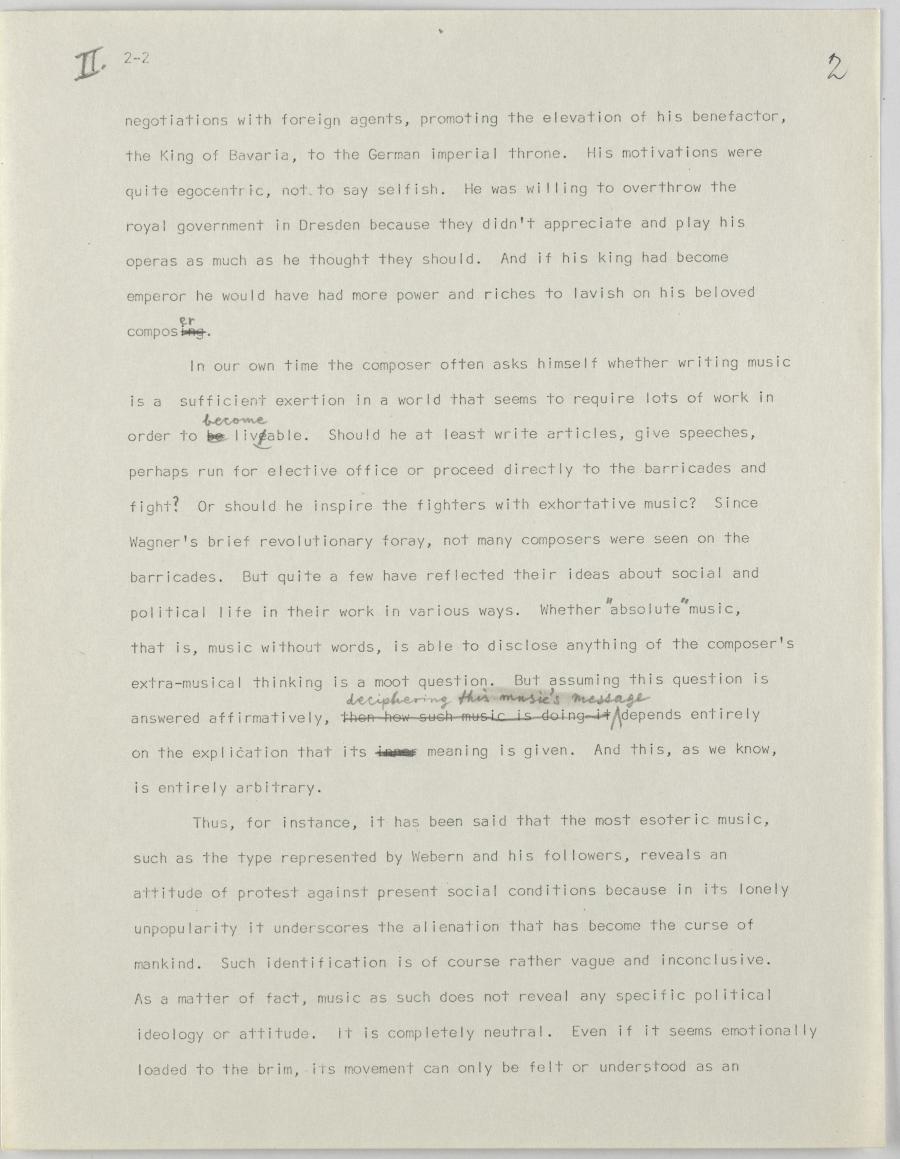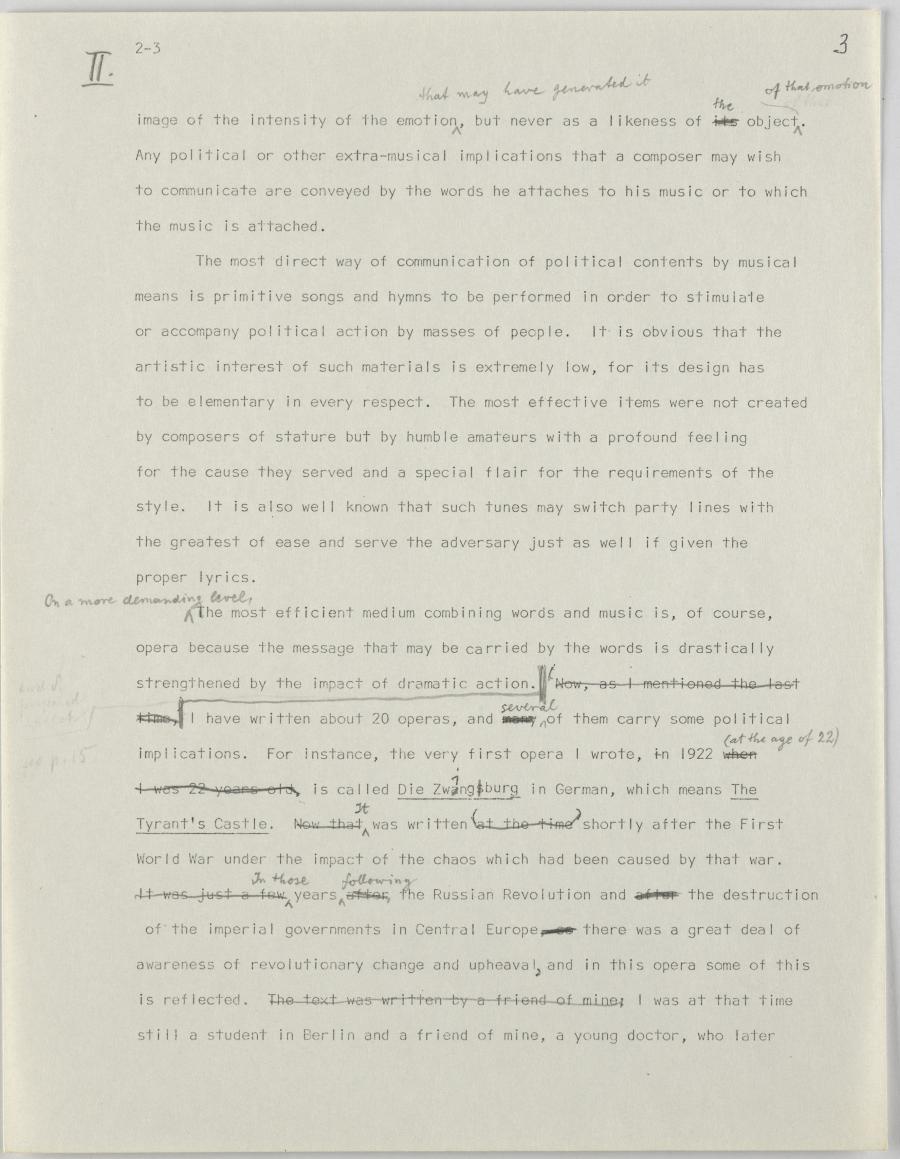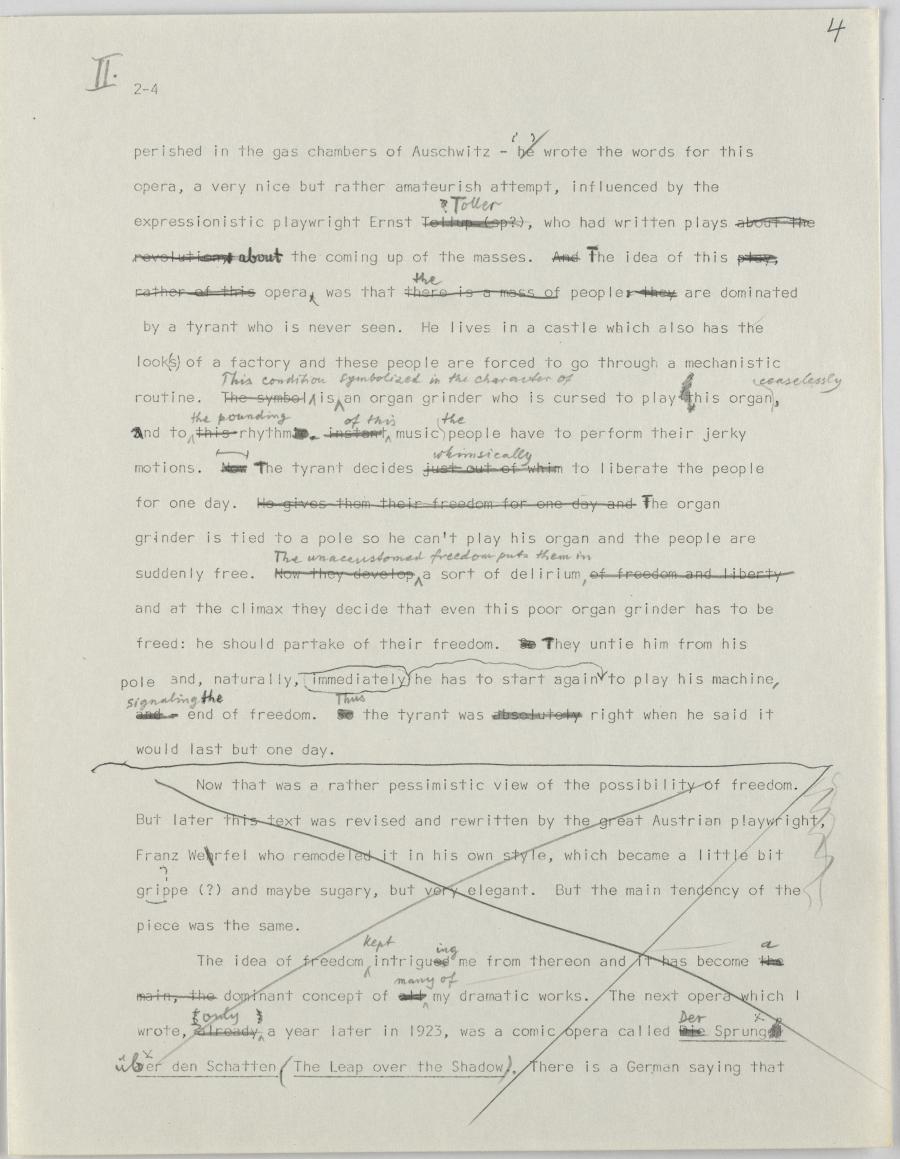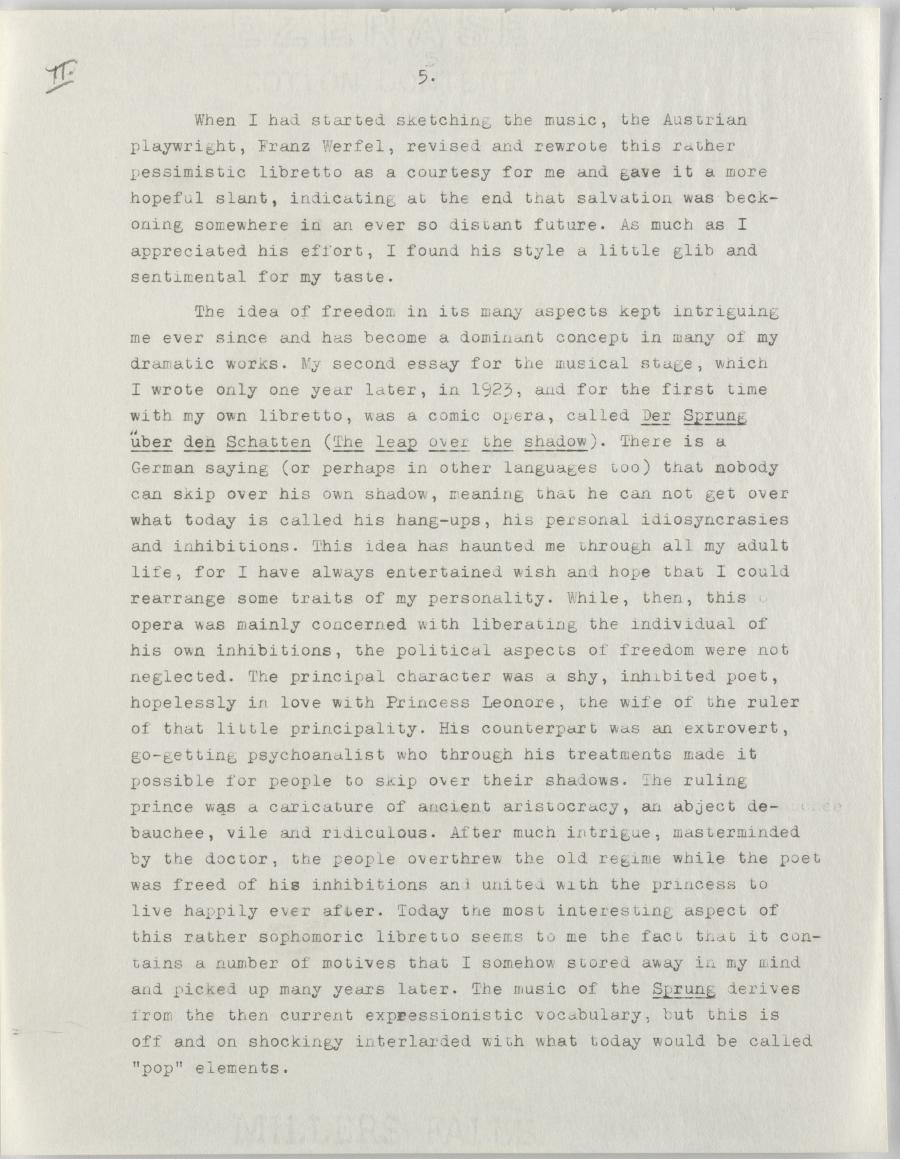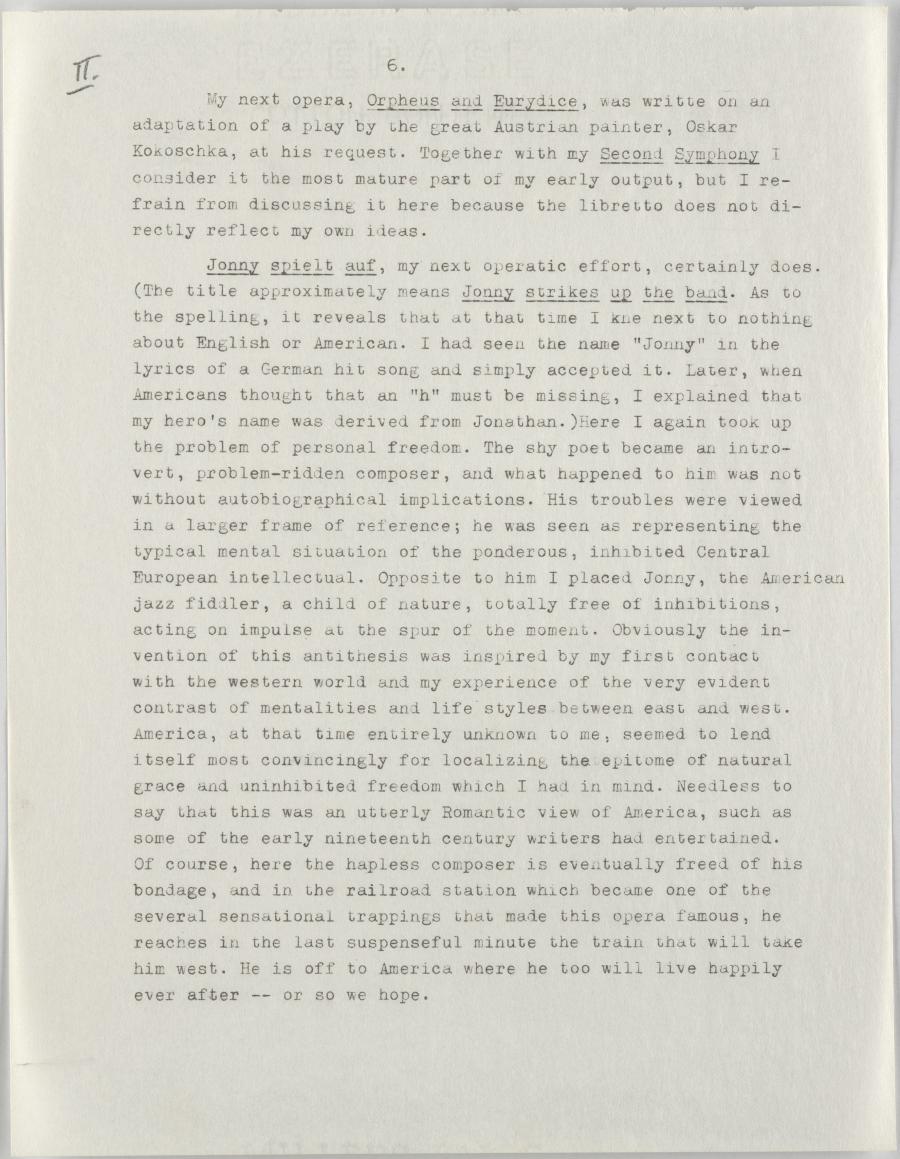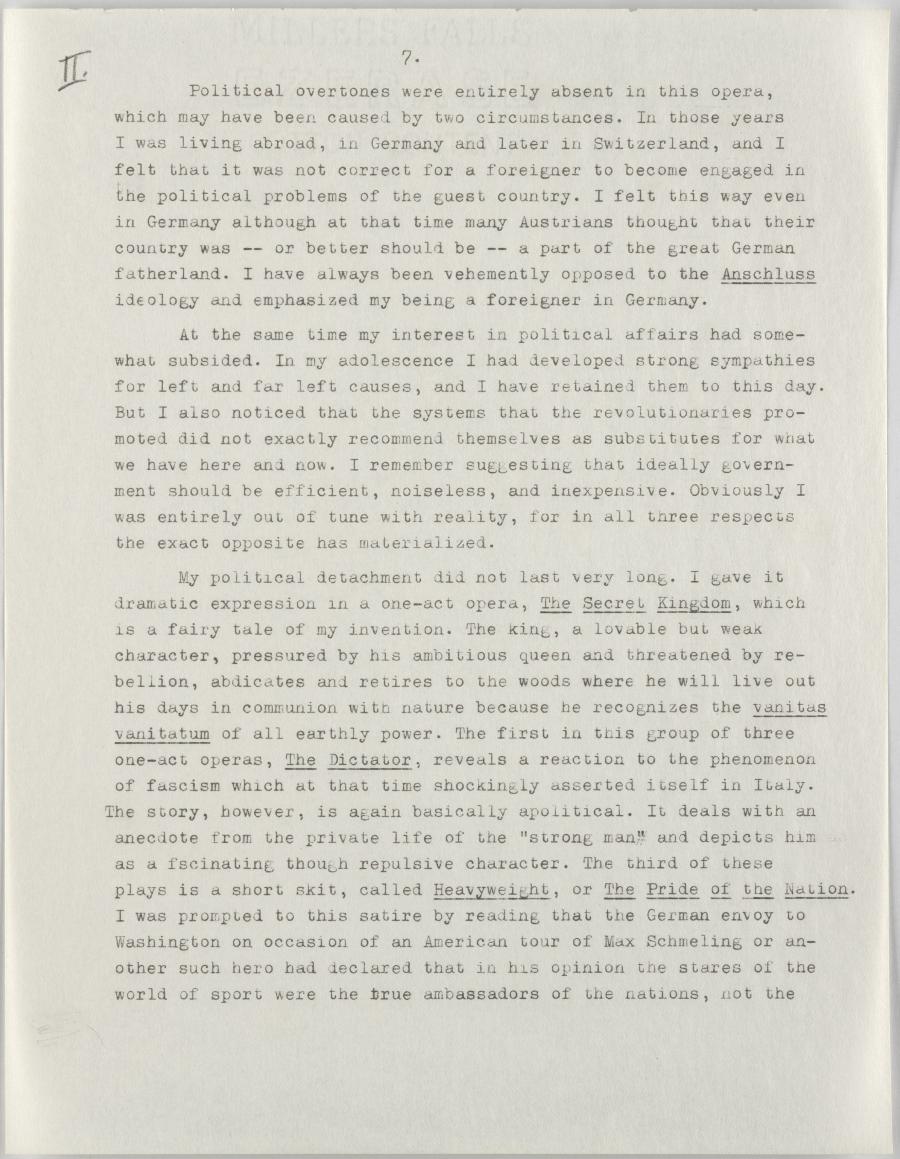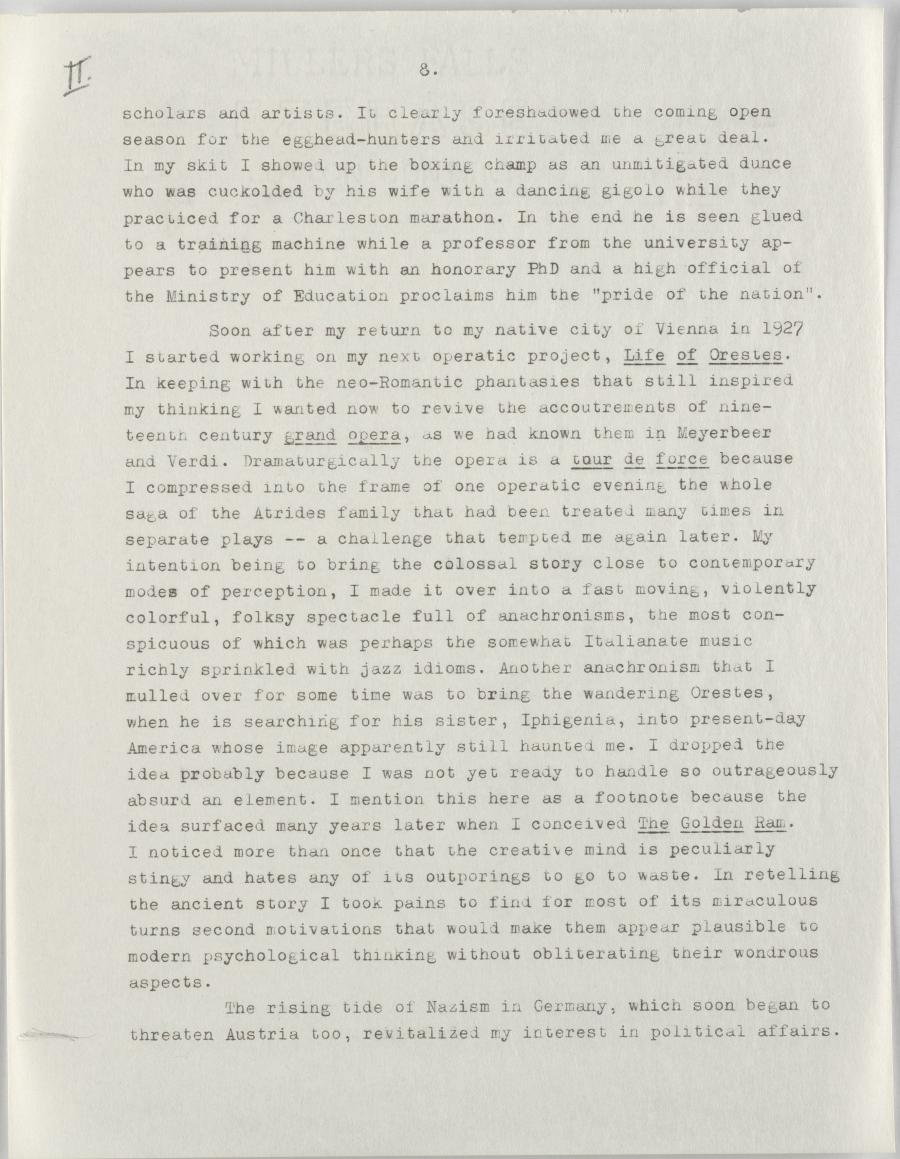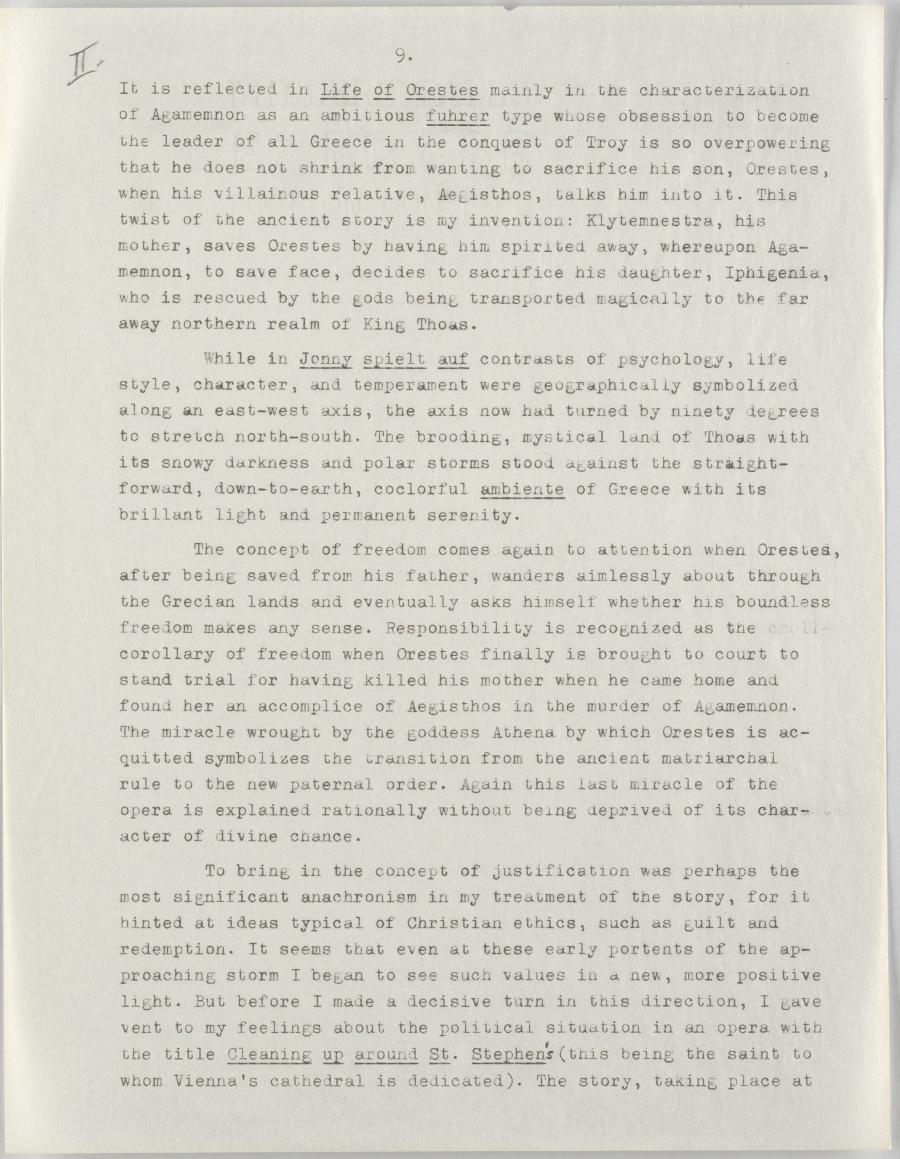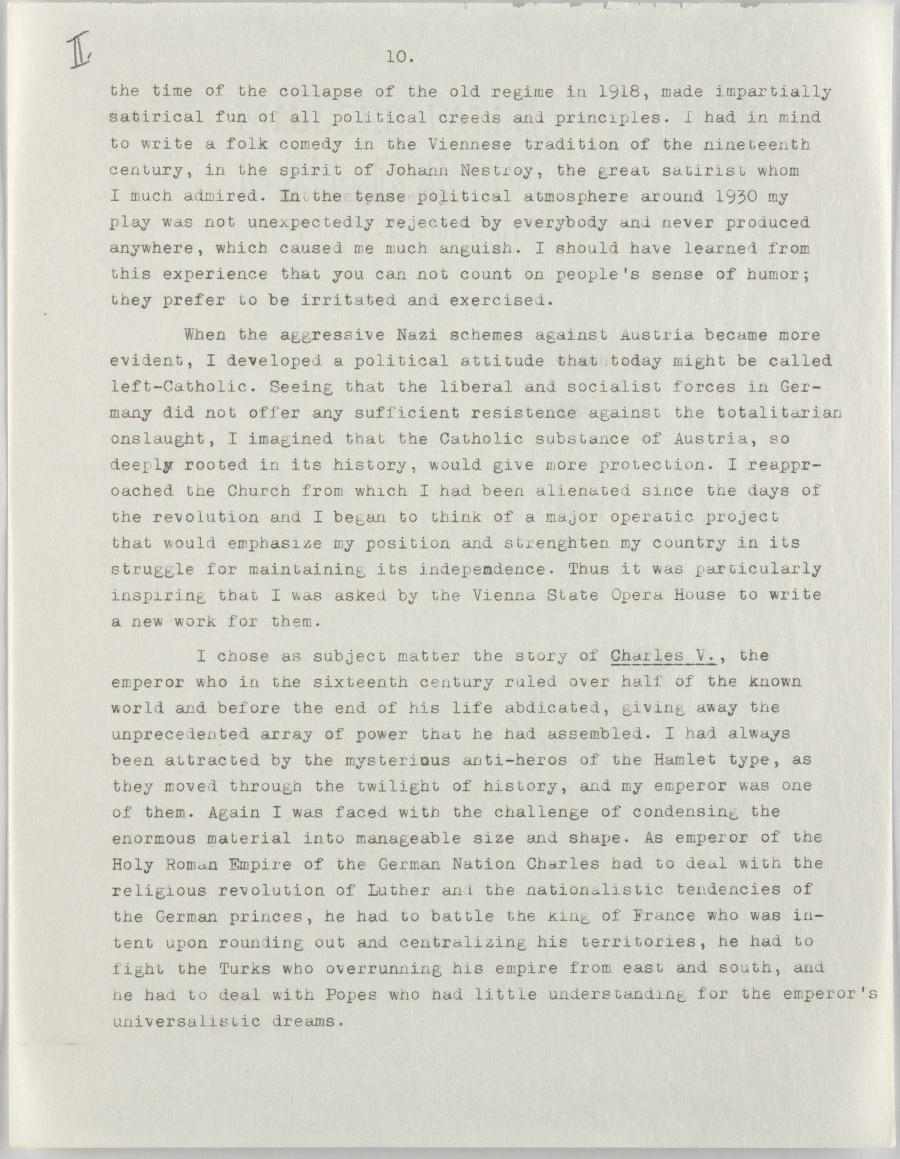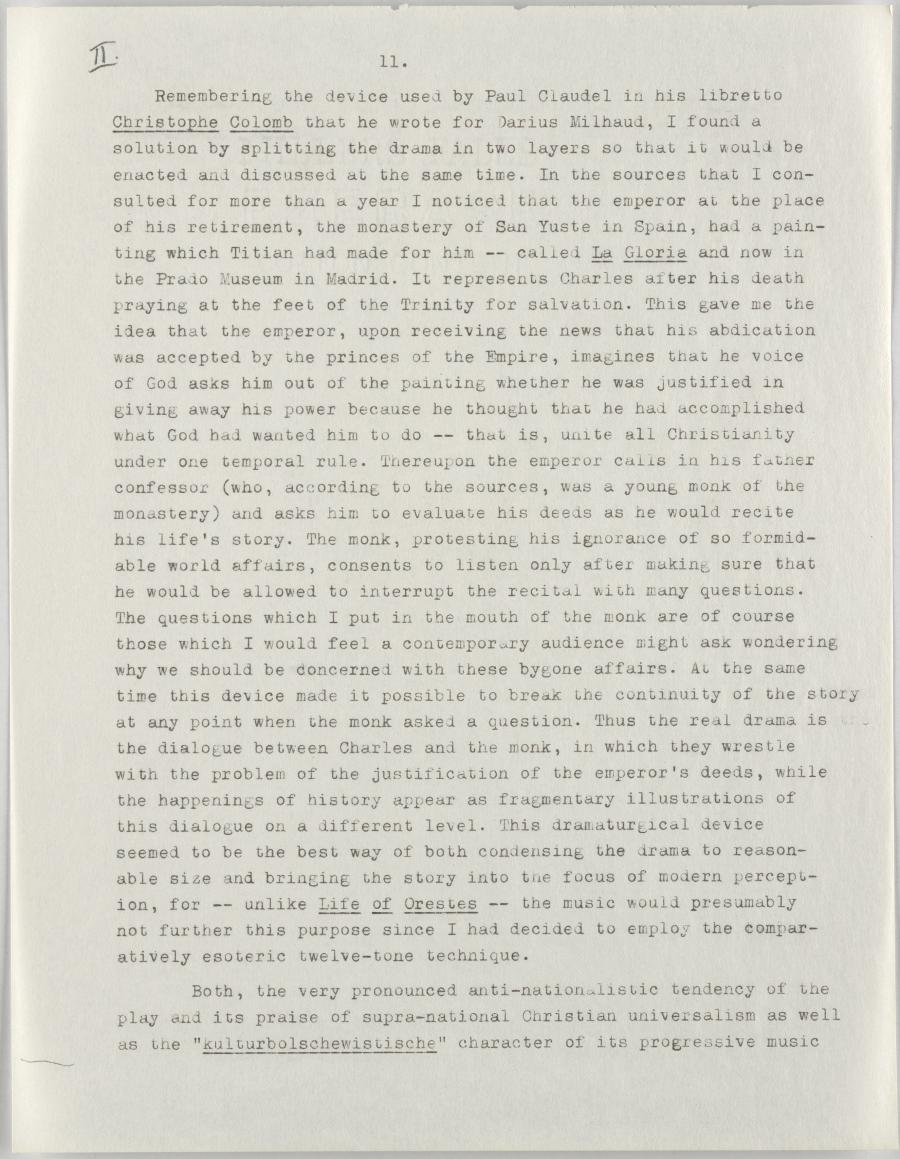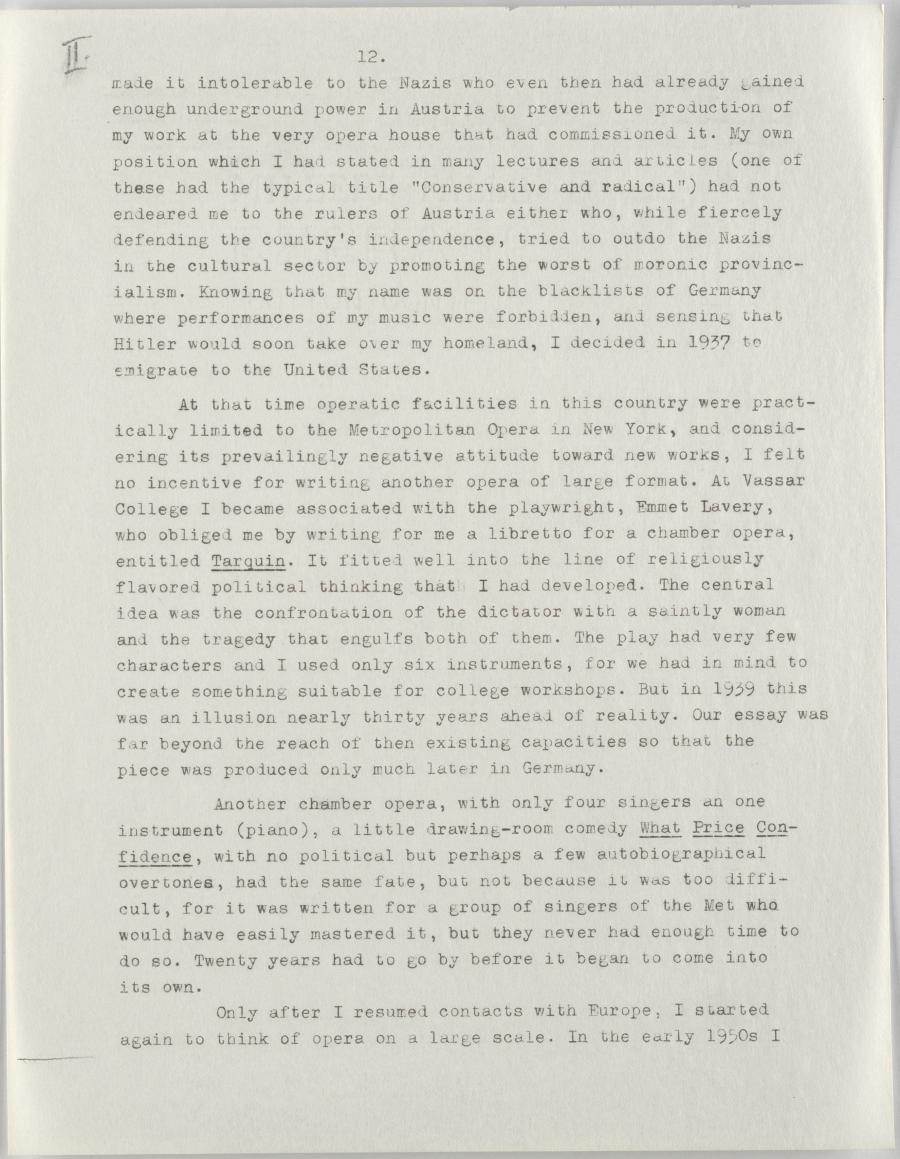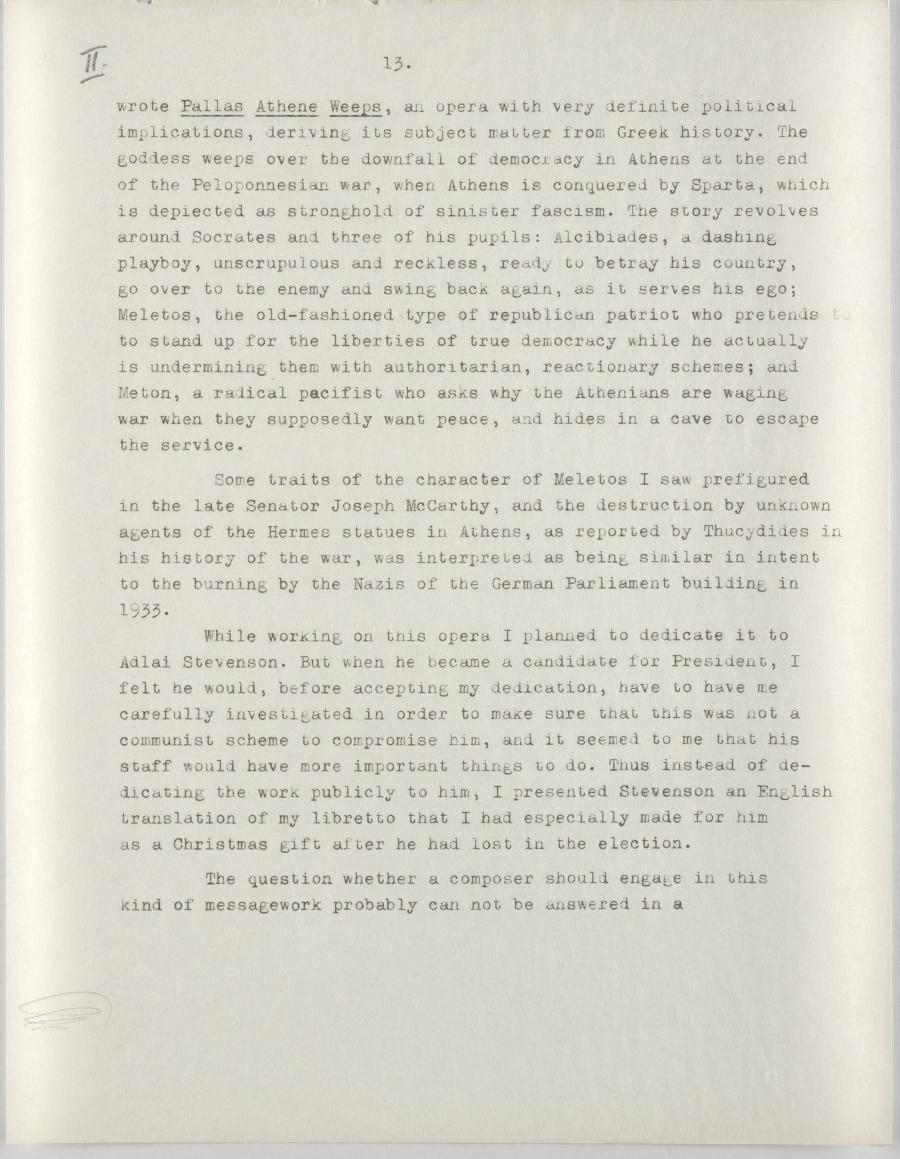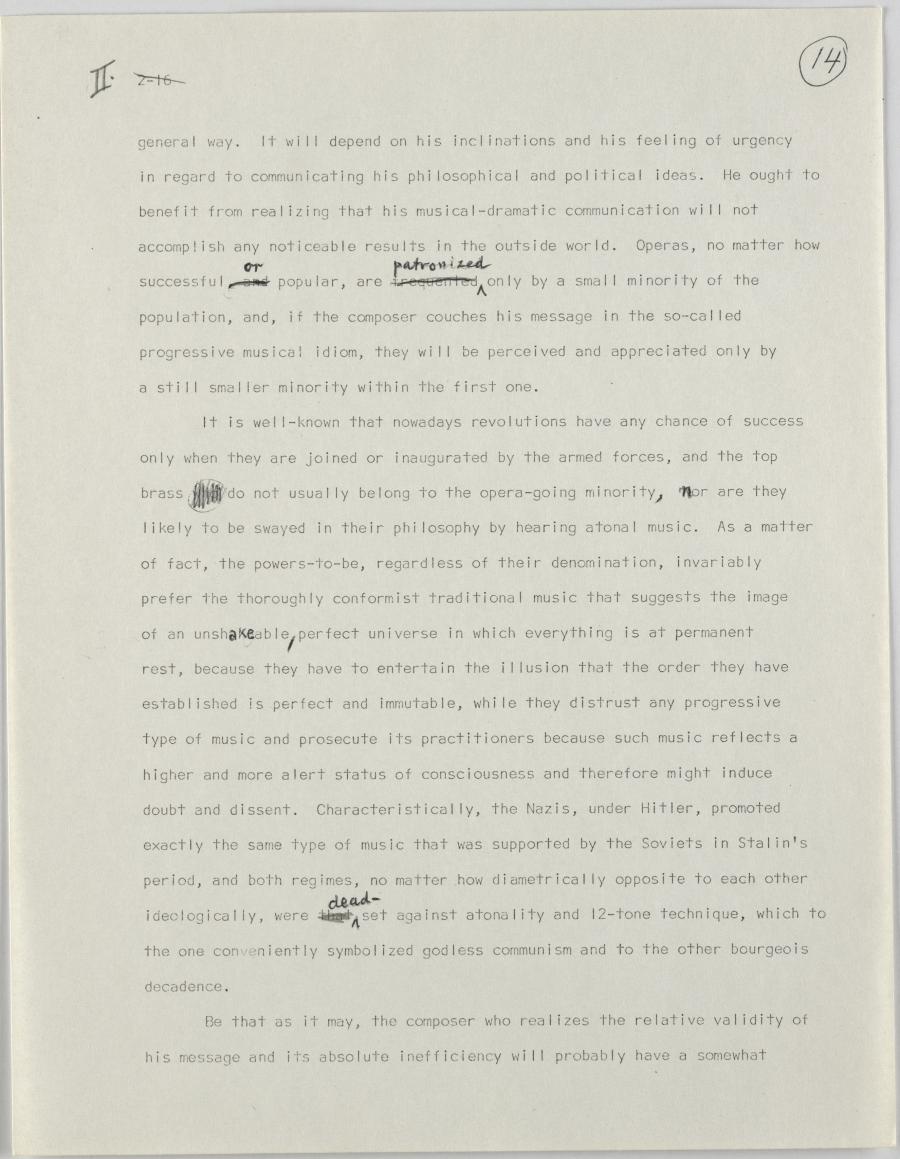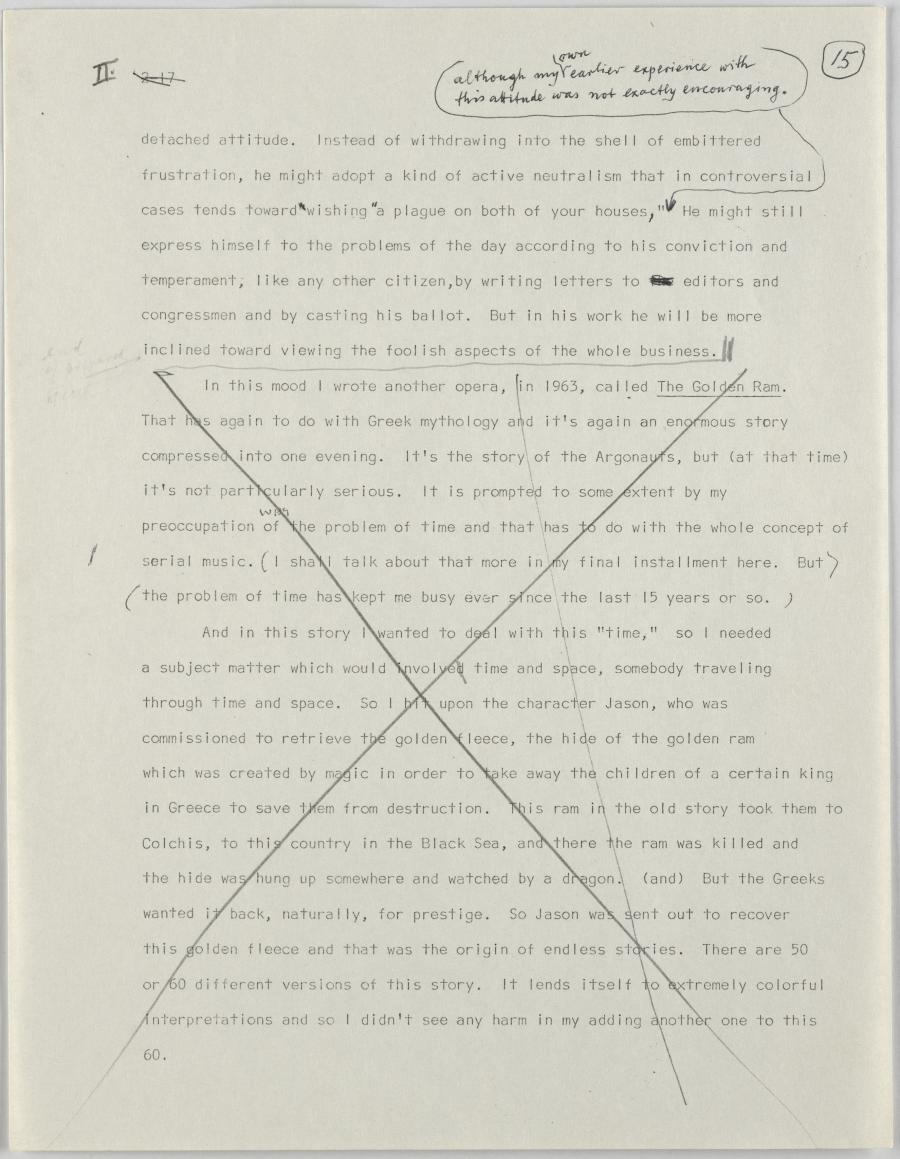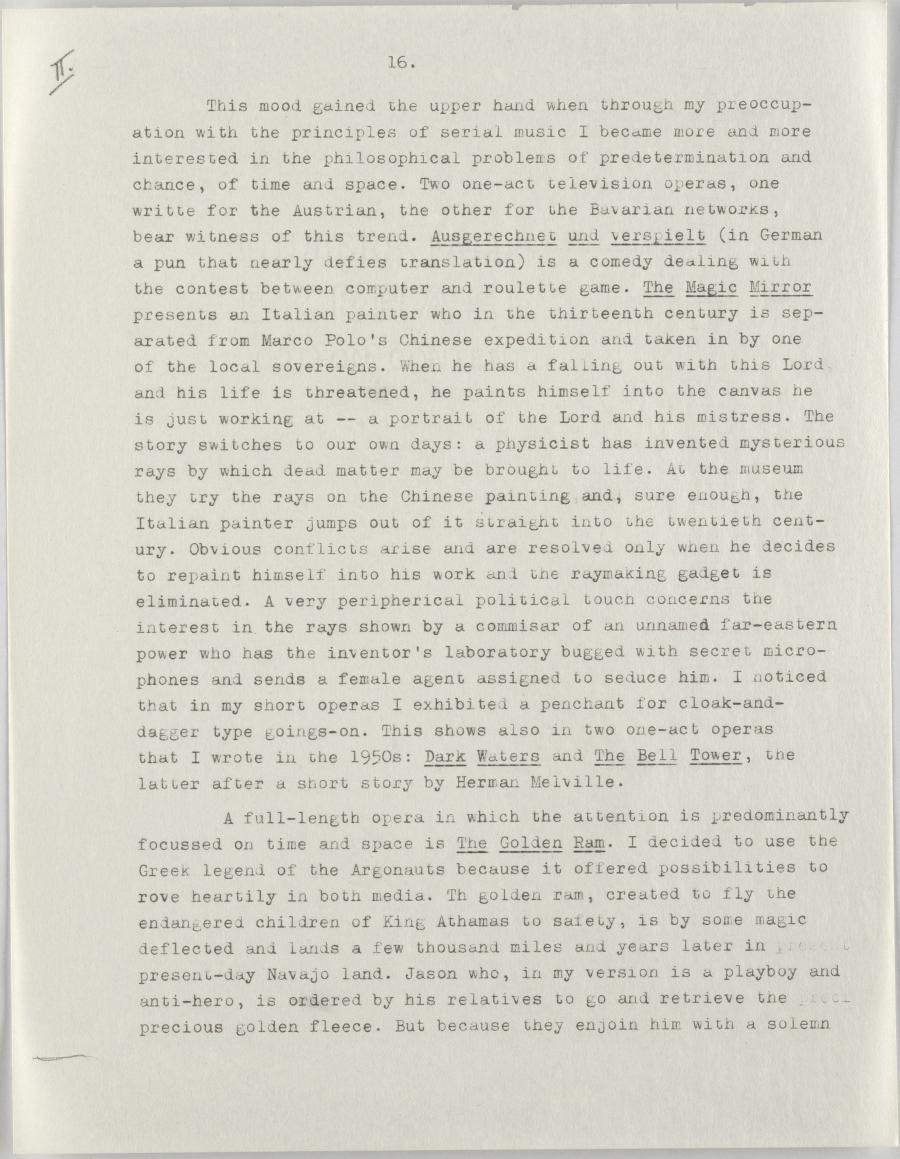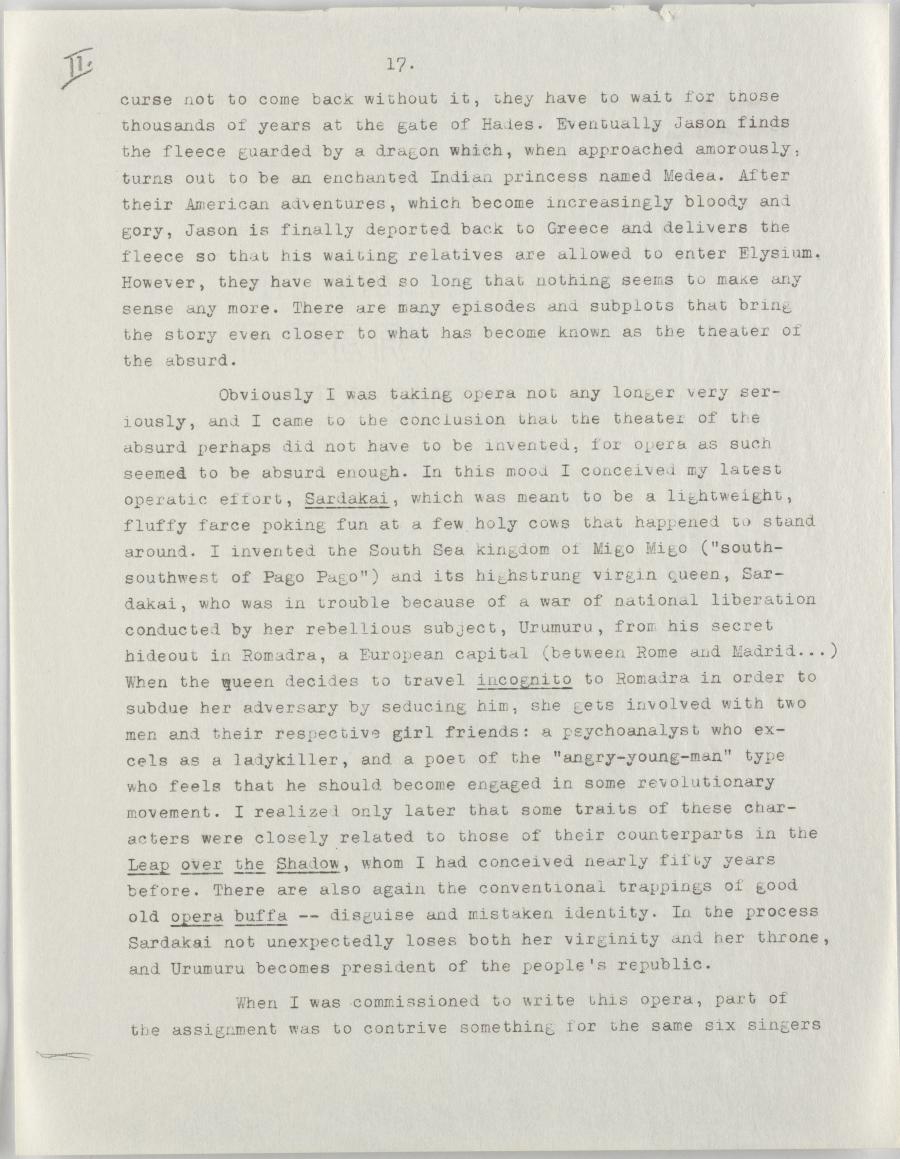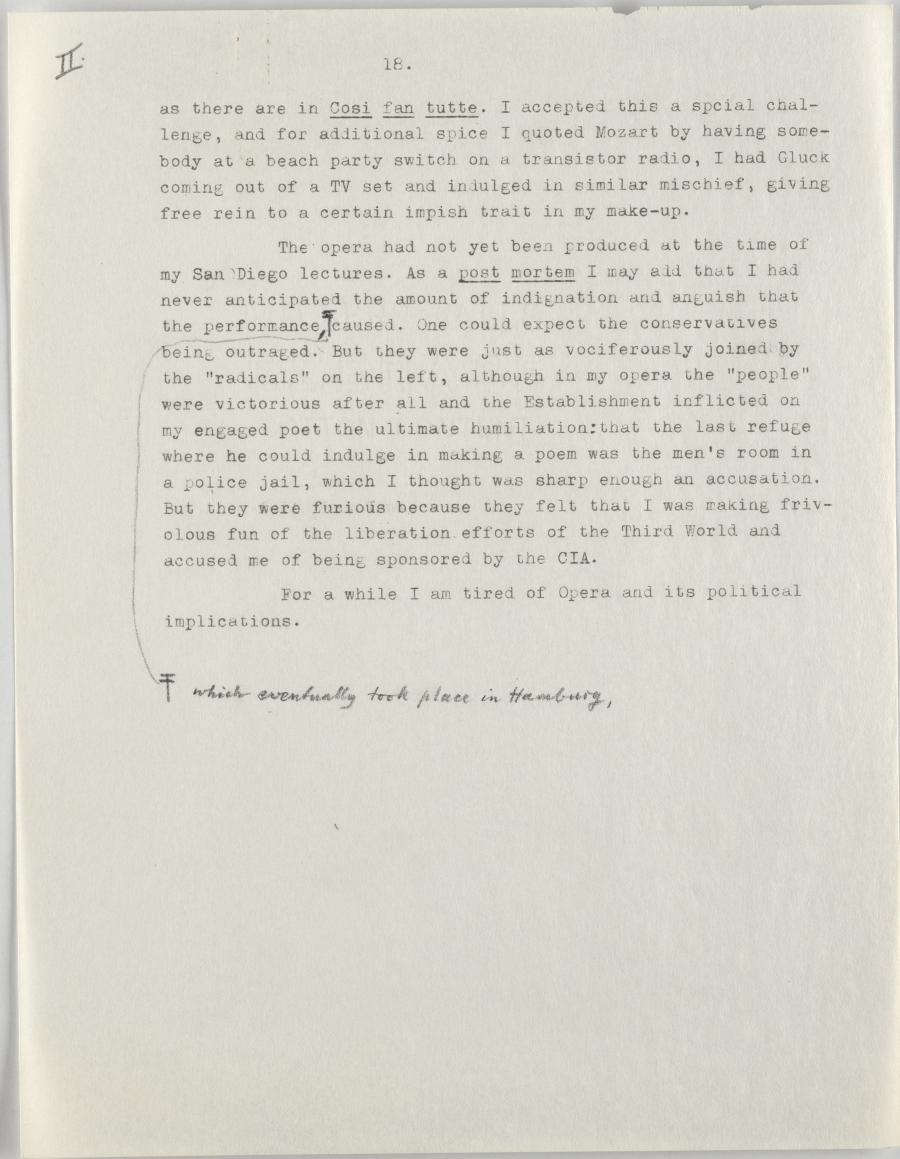A composer viewing this century's music. [UCSD Lecture II]
Abstract
Im Jänner und Februar 1970 war Ernst Krenek Regent’s Lecturer an der University of California, San Diego, wo er eine Serie von vier Vorträgen hielt unter dem übergeordneten Titel: „A Composer Viewing This Century’s Music“. Die Vorträge wurden jeweils Mittwoch abends gehalten und waren einer weit gespannten Themenpallette gewidmet.
Kreneks zweiter Vortrag als Regent’s Lecturer an der UCSD, gehalten am 28. Jänner 1970. Ernst Krenek blickt auf sein eigenes Opernschaffen unter der Perspektive von politischem Engagement in jeweils unterschiedlichen politischen Kontexten, vom Zusammenbruch der westeuropäischen politischen Ordnung nach dem 1. Weltkrieg und der zeitgleichen russischen Revolution, über Faschismus und Nationalsozialismus, McCarthy-Ära bis zu post-kolonialistischen Aspekten.
out of order.Figaro that carried some revolutionary implications; and The Magic Flute,
with its Freemason's humanitarian background seem to point in this
direction. Flashes of political awareness are ascribed to
The instances in which a composer's political engagement manifests
itself in real-life action are rare. By far the most decided position was
certainly taken by from
negotiations with foreign agents, promoting the elevation of his benefactor,
the ing
In our own time the composer often asks himself whether writing music
is a sufficient exertion in a world that seems to require lots of work in
be eable.then how such music is doing it
Thus, for instance, it has been said that the most esoteric music,
such as the type represented by
image of the intensity of the its
The most direct way of communication of political contents by musical means is primitive songs and hymns to be performed in order to stimulate or accompany political action by masses of people. It is obvious that the artistic interest of such materials is extremely low, for its design has to be elementary in every respect. The most effective items were not created by composers of stature but by humble amateurs with a profound feeling for the cause they served and a special flair for the requirements of the style. It is also we known that such tunes may switch party lines with the greatest of ease and serve the adversary just as well if given the proper lyrics.
many when Die in German, which means
The
Tyrant's Castle.
perished in the gas chambers of Tollup (sp?) about therevolution, there is a mass of The symbol this this rhythm to instant just out of whim Now they develop and So absolutely right
Die
. (üb er den Schatten
The leap over the shadow). There is a German saying that
When I had started sketching the music, the Austrian
playwright,
The idea of freedom in its many aspects kept intriguing
me ever since and has become a dominant concept in many of my
dramatic works. My second essay for the musical stage, which
I wrote only one year later, in 1923, and for the first time
with my own libretto, was a comic opera, called Der Sprungüber den SchattenThe leap over the shadow). There is a
German saying (or perhaps in other languages too) that nobody
can skip over his own shadow, meaning that he can not get over
what today is called his hang-ups, his personal idiosyncrasies
and inhibitions. This idea has haunted me through all my adult
life, for I have always entertained wish and hope that I could
rearrange some traits of my personality. While, then, this
opera was mainly concerned with liberating the individual of
his own inhibitions, the political aspects of freedom were not
neglected. The principal character was a shy, inhibited poet,
hopelessly in love with Princess Leonore, the wife of the ruler
of that little principality. His counterpart was an extrovert,
go-getting psychoanalist who through his treatments made it
possible for people to skip over their shadows. The ruling
prince was a caricature of ancient aristocracy, an abject de-
bauchee, vile and ridiculous. After much intrigue, masterminded
by the doctor, the people overthrew the old regime while the poet
was freed of his inhibitions and united with the princess to
live happily ever after. Today the most interesting aspect of
this rather sophomoric libretto seems to me the fact that it con-
tains a number of motives that I somehow stored away in my mind
and picked up many years later. The music of the Sprung derives
from the then current expressionistic vocabulary, but this is
off and on shockingy interlarded with what today would be called
"pop" elements.
My next opera, Orpheus and EurydiceSecond Symphony
Jonny spielt aufJonny strikes up the band. As to
the spelling, it reveals that at that time I kne next to nothing
about English or American. I had seen the name "Jonny in the
lyrics of a German hit song and simply accepted it. Later, when
Americans thought that an "h" must be missing, I explained that
my hero's name was derived from Jonathan.) Here I again took up
the problem of personal freedom. The shy poet became an intro-
vert, problem-ridden composer, and what happened to him was not
without autobiographical implications. His troubles were viewed
in a larger frame of reference; he was seen as representing the
typical mental situation of the ponderous, inhibited Central
European intellectual. Opposite to him I placed Jonny, the American
jazz fiddler, a child of nature, totally free of inhibitions,
acting on impulse at the spur of the moment. Obviously the in-
vention of this antithesis was inspired by my first contact
with the western world and my experience of the very evident
contrast of mentalities and life styles between east and west.
America, at that time entirely unknown to me, seemed to lend
itself most convincingly for localizing the epitome of natural
grace and uninhibited freedom which I had in mind. Needless to
say that this was an utterly Romantic view of
Political overtones were entirely absent in this opera,
which may have been caused by two circumstances. In those years
I was living abroad, in Anschluss
ideology and emphasized my being a foreigner in
At the same time my interest in political affairs had some- what subsided. In my adolescence I had developed strong sympathies for left and far left causes, and I have retained them to this day. But I also noticed that the systems that the revolutionaries pro- moted did not exactly recommend themselves as substitutes for what we have here and now. I remember suggesting that ideally govern- ment should be efficient, noiseless, and inexpensive. Obviously I was entirely out of tune with reality, for in all three respects the exact opposite has materialized.
My political detachment did not last very long. I gave it
dramatic expression in a one-act opera, The Secret Kingdomvanitas
vanitatum of all earthly power. The first in this group of three
one-act operas, The DictatorHeavyweight, or The Pride of the Nation
scholars and artists. It clearly foreshadowed the coming open season for the egghead-hunters and irritated me a great deal. In my skit I showed up the boxing champ as an unmitigated dunce who was cuckolded by his wife with a dancing gigolo while they practiced for a Charleston marathon. In the end he is seen glued to a training machine while a professor from the university ap- pears to present him with an honorary PhD and a high official of the Ministry of Education proclaims him the "pride of the nation.
Soon after my return to my native city of Life of Orestesgrand opera, as we had known them in tour de force because
I compressed into the frame of one operatic evening the whole
saga of the Atrides family that had been treated many times in
separate plays - a challenge that tempted me again later. My
intention being to bring the colossal story close to contemporary
modes of perception, I made it over into a fast moving, violently
colorful, folksy spectacle full of anachronisms, the most con-
spicuous of which was perhaps the somewhat Italianate music
richly sprinkled with jazz idioms. Another anachronism that I
mulled over for some time was to bring the wandering Orestes,
when he is searching for his sister, Iphigenia, into present-day
America whose image apparently still haunted me. I dropped the
idea probably because I was not yet ready to handle so outrageously
absurd an element. I mention this here as a footnote because the
idea surfaced many years later when I conceived The Golden Ram
The rising tide of Nazism in
It is reflected in Life of Orestesfuhrer type whose obsession to become
the leader of all
While in Jonny spielt auf contrasts of psychology, life
style, character, and temperament were geographically symbolized
along an east-west axis, the axis now had turned by ninety degrees
to stretch north-south. The brooding, mystical land of Thoas with
its snowy darkness and polar storms stood against the straight-
forward, down-to-earth, coclorful ambiente of
The concept of freedom comes again to attention when Orestes, after being saved from his father, wanders aimlessly about through the Grecian lands and eventually asks himself whether his boundless freedom makes any sense. Responsibility is recognized as the corollary of freedom when Orestes finally is brought to court to stand trial for having killed his mother when he came home and found her an accomplice of Aegistos in the murder of Agamenon. The miracle wrought by the goddess Athena by which Orestes is ac- quitted symbolizes the transition from the ancient matriarchal rule to the new paternal order. Again this last miracle of the opera is explained rationally without being deprived of its char- acter of divine chance.
To bring in the concept of justification was perhaps the
most significant anachronism in my treatment of the story, for it
hinted at ideas typical of Christian ethics, such as guilt and
redemption. It seems that even at these early portents of the ap-
proaching storm I began to see such values in a new, more positive
light. But before I made a decisive turn in this direction, I gave
vent to my feelings about the political situation in an opera with
the title Cleaning up around St. Stephen
the time of the collapse of the old regime in 1918, made impartially
satirical fun of all political creeds and principles. I had in mind
to write a folk comedy in the Viennese tradition of the nineteenth
century, in the spirit of
When the aggressive Nazi schemes against
I chose as subject matter the story of Charles V., the
emperor who in the sixteenth century ruled over half of the known
world and before the end of his life abdicated, giving away the
unprecedented array of power that he had assembled. I had always
been attracted by the mysterious anti-heros of the Hamlet type, as
they moved through the twilight of history, and my emperor was one
of them. Again I was faced with the challenge of condensing the
enormous material into manageable size and shape. As emperor of the
Holy Roman Empire of the German Nation
Remembering the device used by Christophe Colomb that he wrote for La Gloria and now in
the Prado Museum in Life of Orestes
Both, the very pronounced anti-nationalistic tendency of the
play and its praise of supra-national Christian universalism as well
as the "kulturbolschewistische" character of its progressive music
made it intolerable to the Nazis who even then had already gained
enough underground power in
At that time operatic facilities in this country were pract-
ically limited to the Metropolitan Opera in Tarquin. It fitted well into the line of religiously
flavored political thinking that I had developed. The central
idea was the confrontation of the dictator with a saintly woman
and the tragedy that engulfs both of them. The play had very few
characters and I used only six instruments, for we had in mind to
create something suitable for college workshops. But in 1939 this
was an illusion nearly thirty years ahead of reality. Our essay was
far beyond the reach of then existing capacities so that the
piece was produced only much later in
Another chamber opera, with only four singers an one
instrument (piano), a little drawing-room comedy What Price Con- fidence, with no political but perhaps a few autobiographical
overtones, had the same fate, but not because it was too diffi-
cult, for it was written for a group of singers of the Met who
would have easily mastered it, but they never had enough time to
do so. Twenty years had to go by before it began to come into
its own.
Only after I resumed contact with
wrote Pallas Athene Weeps, an opera with very definite political
implications, deriving its subject matter from Greek history. The
goddess weeps over the downfall of democracy in
Some traits of the character of Meletos I saw prefigured
in the late Senator
While working on this opera I planned to dedicate it to
The question whether a composer should engage in this kind of messagework probably can not be answered in a
14II.
general way. It will depend on his inclinations and his feeling of urgency
in regard to communicating his philosophical and political ideas. He ought to
benefit from realizing that his musical-dramatic communication will not
accomplish any noticeable results in the outside world. Operas, no matter how
successful and frequented
It is well-known that nowadays revolutions have any chance of success
only when they are joined or inaugurated by the armed forces, and the top
brass that
Be that as it may, the composer who realizes the relative validity of his message and its absolute inefficiency will probably have a somewhat
15 II.
detached attitude. Instead of withdrawing into the shell of embittered
frustration, he might adopt a kind of active neutralism that in controversial
cases tends toward "wishing "a plague on both of your houses,"
The Golden Ram.
This mood gained the upper hand when through my preoccup-
ation with the principles of serial music I became more and more
interested in the philosophical problems of predetermination and
chance, of time and space. Two one-act television operas, one
writte for the Austrian, the other for the Bavarian networks,
bear witness of this trend. Ausgerechnet und verspieltThe Magic MirrorDark WatersThe Bell Tower
A full-length opera in which the attention is predominantly
focussed on time and space is The Golden Rampreci
precious golden fleece. But because they enjoin him with a solemn
curse not to come back without it, they have to wait for those
thousands of years at the gate of Hades. Eventually Jason finds
the fleece guarded by a dragon which, when approached amorously,
turns out to be an enchanted Indian princess named Medea. After
their American adventures, which become increasingly bloody and
gory, Jason is finally deported back to
Obviously I was taking opera not any longer very ser-
iously, and I came to the conclusion that the theater of the
absurd perhaps did not have to be invented, for opera as such
seemed to be absurd enough. In this mood I conceived my latest
operatic effort, Sardakai, which was meant to be a lightweight,
fluffy farce poking fun at a few holy cows that happened to stand
around. I invented the South Sea kingdom of Migo Migo ("south-
southwest of Pago Pago") and its highstrung virgin queen, Sar-
dakai, who was in trouble because of a war of national liberation
conducted by her rebellious subject, Urumuru, from his secret
hideout in Romadra, a European capital (between
incognitoto Romadra in order to subdue her adversary by seducing him, she gets involved with two men and their respective girl friends: a psychoanalyst who ex- cels as a ladykiller, and a poet of the "angry-young-man" type who feels that he should become engaged in some revolutionary movement. I realized only later that some traits of these char- acters were closely related to those of their counterparts in the
Leap
over
the
Shadow
opera
buffa- disguise and mistaken identity. In the process Sardakai not unexpectedly loses both her virginity and her throne, and Urumuru becomes president of the people's republic.
When I was commissioned to write this opera, part of the assignment was to contrive something for the same six singers
18. II.
as there are in Cosi fan tutte
The opera had not yet been produced at the time of
my post mortem I may add that I had
never anticipated the amount of indignation and anguish that
the performance,
For a while I am tired of Opera and its political implications.
